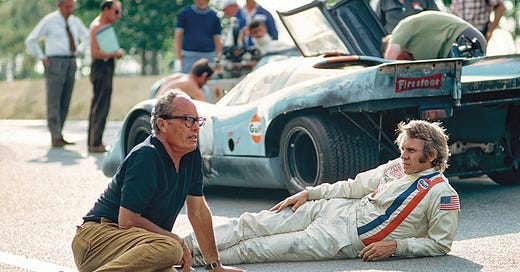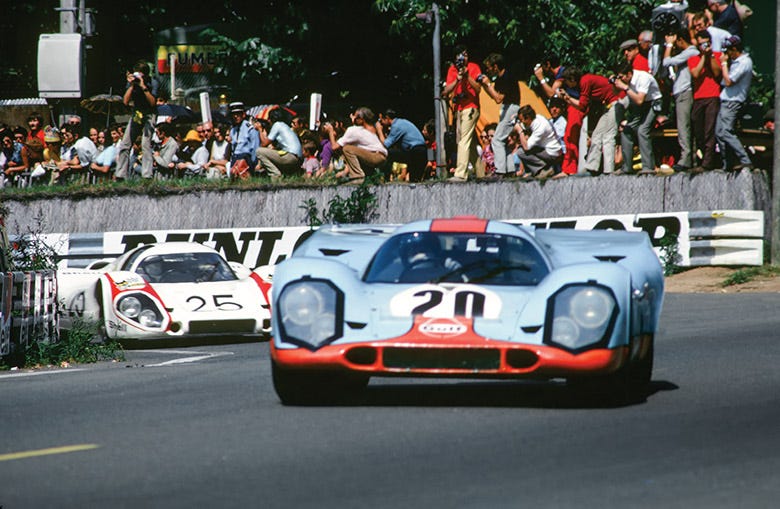The bottom line is that I love Le Mans (1971), a film with very little story and almost no dialogue and which is only about the famous 24 hours race in France, where the whole film was shot during the race of 1970. It is not a documentary, although it could be mistaken for one if it were not for the presence of Steve McQueen who plays the leading character. All these things are the reasons for why I love it, although I would not just recommend it to anyone. It is a film of style and racing cars1, nothing else, and if that is not working for you then you will inevitably be bored by it. Or maybe not. In her review for the Sunday Times, Dilys Powell wrote “You can’t hear the words for the noise, you can’t follow the action for the speed. But you can sit back and be distinctly stirred.”
McQueen had wanted to make such a film for a long time, as cars were among his primary interests, and racing with them. He had made three films with producer/director John Sturges, from 1959 to 1963, and they decided to make this one together as well; the project was gestating all through the 1960s.2 But for various reasons it was not until 1970 that they began filming, and immediately there was conflict. McQueen wanted it the way it would eventually end up, all cars and no story, whereas Sturges wanted a strong storyline about the racing men and their women. That would have been the conventional way, but McQueen would not have that, and fought with Sturges and refused to accept any scripts with a plot and dialogue. On their previous films, Sturges had been the boss and McQueen had done what Sturges told him to do. But this was McQueen’s project, it was his company Solar that produced it together with Cinema Center Film,3 and it seems this made him feel above Sturges. So Sturges quit after seven weeks, with the immortal words “I’m too old and too rich for this shit. I’m going home.”4
They had filmed a lot of material but most people involved, except McQueen, were as concerned as Sturges about the way things were going. Another director was hired, Lee H. Katzin, who mostly did TV productions otherwise, and for some reason McQueen allowed himself to be directed. When it came to post-production, McQueen was not involved, and he was kept out of the editing process.5 Yet, as I said, the film that emerged was like he wanted it to be. You might say it is an art film about a car race.
The film begins with a man driving his Porsche through the French countryside. It is the main character Michael Delaney, played by McQueen. When he comes to a small town he stops and looks at a woman buying some flowers. Then he drives on and eventually reaches Le Mans, where the racing field is. He stops and gets out of the car, and in a brief, almost psycedelic, flashback we see him having an accident there, in which another driver was killed. Then he gets back into the car and drives away, and the title sequence begins.
You might think that there will be some male conflict or male bonding but there is none. You might think McQueen’s character Delaney will win the race, but he does not. You might think some driver will be killed, but no one is. There is some drama, such as an intense car crash and some heavy rain, but that is kept to a minimum. The first scene with dialogue comes after 39 minutes. That dialogue scene is between Delaney and the woman he saw buying flowers in the town. She, played by Elga Andersen, is the widow of a driver killed the previous year, and their conversation is brief:
“Hello.” he says.
“Hello.” she says.
“You had a very good start.”
“It’s a long race.”
and then he adds
“Are you well?”
She just nods, and he nods back and then says, “Excuse me.”
In another scene five minutes later another driver tells his wife that this is going to be his last race, which pleases her.6 Delaney and the widow also have another brief scene together, where he is again asking how she is doing now. And finally, in the end, after Delaney has had to abandon the race and they sit together in a caravan, she asks him what is so important about driving faster than anyone else. He replies quietly, looking slightly to the side, towards the noise from the cars outside, almost as if talking to himself: “Lotta people go through life doing things badly. Racing's important to men who do it well. When you're racing it… it's life. Anything that happens before or after is just waiting.” I find that scene immensely powerful, even moving, because of the way he says the words, his facial expression, and whole body language.7
That line also sums up the film. Racing is the film; the rest is just waiting. What I described above are all non-racing scenes and all dialogue that is not technical comments between crew members and drivers. The film is its beautiful camera work, editing, and sound design,8 the cars swishing by, and all the pit stops, the changing of the tyres or of the seats, the filling up of petrol and the polishing of the windshields. That is all I need. Over the years I have seen it four times, and I will probably watch it again soon. The 93rd 24 Hours of Le Mans race takes place in mid-June 2025. Ideally, I should go and watch the actual race too, and see how it compares to this one from 1970.
When I was a teenager, cars were for me what eventually film became, i.e. my main special interest. At one point I was subscribing to four different Swedish car journals, and reading English and German car magazines whenever I could get my hands on them. I do not have such an interest anymore, those days are long gone, but some cars and car-related things still excite me. Here I wrote about Aston Martin for example: https://fredrikonfilm.blogspot.com/2018/07/aston-martin.html
Their previous films together were Never So Few (1959), The Magnificent Seven (1960), and The Great Escape (1963). I wrote about Sturges here: https://fredrikonfilm.blogspot.com/2022/04/john-sturges.html
Cinema Center Film was the TV network CBS’s production company for theatrical releases.
Lovell, Glenn, Escape Artist - The Life and Films of John Sturges (University of Wisconsin Press 2008), p. 257.
Keyser, Michael and Jonathan Williams, A French Kiss with Death - Steve McQueen and the Making of Le Mans: The Man, The Race, The Cars, The Movie (Bentley Publishers 1999), p. 404.
Usually this would be a setup for him to be killed, but the driver is alive and well when the film is over.
You can watch that wonderful scene here:
Beyond the two directors, an unknown number of writers, cinematographers, and editors worked on the film, some credited but many uncredited.





